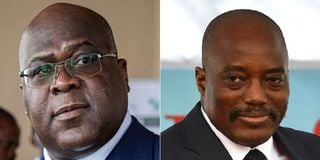Premium
Fight between Tshisekedi, Kabila exposes DRC to chaos

President of Democratic Republic of Congo Felix Tshisekedi (left) and former President Joseph Kabila.
The Democratic Republic of Congo (DRC) experienced great political tension this week, with the capital Kinshasa, which is usually the seat of State institutions, remaining tense after the ruling coalition was terminated.
President Félix Tshisekedi on December 6 ended the coalition partnership with his predecessor Joseph Kabila. Now, he wants to reverse the balance of power in the National Assembly which had favoured Kabila’s side.
In doing this, it will allow him to have a majority at Parliament and a government totally loyal to his cause. By Wednesday, it looked like the Head of State had made up his mind to force through the changes. If he succeeds, it will mean that he will have largely annihilated former President Kabila.
Tshisekedi's move is not without risk, however, especially since the Common Front for Congo (FCC) under Joseph Kabila has retained most of the power in almost all the 26 provinces of DRC.
Moreover, as a former president-soldier, Kabila succeeded, during his 20 years at the helm, in forming an army in which many generals are said to still be loyal to him to this day. Due to this, several observers reckon that the crisis between Tshisekedi and Kabila could affect all institutions and finally create great chaos in the country.
Internally, but also internationally, voices have been raised to push the new Head of State to dialogue with his predecessor. Those envoys included Kenya’s former vice-president Kalonzo Musyoka, a special envoy of Kenyan President Uhuru Kenyatta who, ten days ago, had tried to mediate in the wrangles in the DRC. He failed apparently.
Along with Moussa Faki, President of the African Union Commission who travelled to Kinshasa and other African leaders, they failed to bring the two leaders together to avoid the current clash.
Other emissaries had come from French President Emmanuel Macron. They too failed.
President Tshisekedi clearly said that "the time is no longer for sterile discussions". It must be said, however, that to each of the national or international mediators, the president said he wanted to speak with "all the most representative political and social actors in the country", but in the context of his consultations which he carried out for three weeks.
In the Kabila camp, too, they said they were ready to discuss with the Head of State, but within the framework of "the mechanisms put in place in the FCC-CACH coalition".
Leïla Zerrougui, representative of the United Nations Secretary-General in Congo and head of the United Nations Mission for the stabilisation of the Congo, expressed her fear of seeing "DRC plunge into an institutional crisis".
As for Antonio Guterres, the UN Secretary-General who unsuccessfully called for peace, he said he "remains concerned about rising political tensions within the ruling coalition." As he said, "it could jeopardise the country's fragile political stability, reduce to nothing the gains obtained since the 2018 elections and the peaceful transfer of power".
With popular support in Kinshasa and in some other large cities, President Tshisekedi wants to have sole control of the country, in order to forge a balance sheet ahead of the 2023 elections.
Tshisekedi will therefore have to fight to attract FCC parliamentarians, along with those from other political parties, in what he calls "the Sacred Union for the Nation".
Battle in parliament
But the Kabila camp will also have to play smart in order not to lose control of the National Assembly.
From this Thursday, December 10, the battle in the National Assembly will have to continue and this fight is decisive for the continuation of the power struggle: several members of this chamber of parliament have signed a petition to remove Jeanine Mabunda from the presidency of the National Assembly, equivalent to a Speaker of the Legislature.
If Ms Mabunda, a strong head of the Kabila camp, falls, this will surely be the sign that Tshisekedi has reversed the balance of power. If the bet is successful, President Tshisekedi, as he himself promised, will carry out reforms, in particular to the Independent National Electoral Commission (CENI).
CENI’s management team must be renewed especially after the appointment of Ronsard Malonda as the Commission’s head was challenged, causing deadly riots and death earlier this year.
After the first peaceful transfer of power in the history of the DRC, which took place in January 2019, observers of Congolese policy are unanimous: “the FCC-CACH coalition has been a failure.”
In the words of many, including Georges Kapiamba, lawyer and human rights activist, the FCC-CACH coalition was "an unnatural marriage". Experts on the country's history are also advising that the ruling class not repeat "mistakes of the past".
Indeed, in DRC, the dispute between the parliamentary majority and the president has always ended with seizure of power by the army. This happened in 1960 and 1965.





